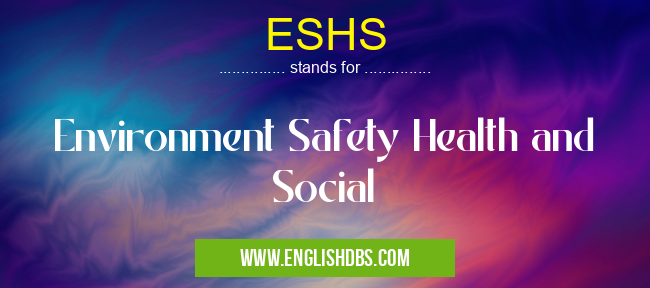What does ESHS mean in HEALTHCARE
ESHS stands for Environment, Safety, Health, and Social. It encompasses a comprehensive approach to manage and mitigate potential risks and impacts on the environment, the health and safety of individuals, and the overall well-being of communities. ESHS is crucial in various industries, particularly in sectors that involve hazardous materials, operations, or environmental concerns.

ESHS meaning in Healthcare in Medical
ESHS mostly used in an acronym Healthcare in Category Medical that means Environment Safety Health and Social
Shorthand: ESHS,
Full Form: Environment Safety Health and Social
For more information of "Environment Safety Health and Social", see the section below.
» Medical » Healthcare
What does ESHS stand for?
-
Environment: Focuses on protecting the natural environment from harmful impacts, including air, water, and soil pollution, as well as managing waste and conserving biodiversity.
-
Safety: Prioritizes the well-being of individuals by preventing accidents, injuries, and occupational hazards through proper risk assessments, hazard controls, and emergency response plans.
-
Health: Aims to safeguard the physical and mental well-being of individuals by promoting healthy practices, monitoring occupational exposure to hazardous substances, and providing access to healthcare services.
-
Social: Considers the ethical, social, and cultural impacts of an organization's activities on the surrounding communities. This includes addressing issues such as human rights, labor practices, and community engagement.
Essential Questions and Answers on Environment Safety Health and Social in "MEDICAL»HEALTHCARE"
What is Environment, Safety, Health and Social (ESHS)?
ESHS is a comprehensive approach that integrates environmental management, occupational health and safety, and social responsibility to mitigate potential risks and ensure the well-being of employees, communities, and the environment.
Why is ESHS important in business operations?
ESHS promotes ethical and sustainable practices, reduces operational costs, attracts and retains employees, enhances brand reputation, improves productivity, and minimizes legal and regulatory risks.
How does ESHS differ from traditional safety management?
ESHS takes a broader perspective, considering not only workplace safety but also the impact on the environment and society. It emphasizes proactive risk management, stakeholder engagement, and continuous improvement.
What are some key benefits of implementing an ESHS program?
Benefits include enhanced operational efficiency, improved employee morale, reduced accidents and incidents, compliance with regulations, strengthened stakeholder relationships, and increased profitability.
What are some common challenges in implementing an ESHS program?
Challenges may include resistance to change, limited resources, stakeholder engagement, data collection and analysis, and aligning ESHS initiatives with business goals.
How can organizations overcome challenges in ESHS implementation?
Organizations can overcome challenges by involving stakeholders, establishing clear goals and objectives, providing training and support, leveraging technology, and seeking external expertise when necessary.
What are some best practices for ESHS management?
Best practices include setting up clear policies and procedures, identifying and assessing risks, conducting regular audits, encouraging employee participation, and integrating ESHS into business decision-making processes.
How does ESHS relate to sustainability?
ESHS is an essential component of sustainability, as it considers the environmental and social implications of business activities and promotes responsible resource management and community engagement.
What are some key trends in ESHS?
Emerging trends include digital transformation, increased stakeholder pressure, focus on health and well-being, and the adoption of innovative technologies for risk management and compliance.
Final Words: ESHS is an essential framework that enables organizations to operate responsibly and sustainably by mitigating risks and ensuring the long-term health and safety of individuals, the environment, and society. By embracing ESHS principles, organizations can enhance their reputation, reduce liabilities, and contribute positively to the communities in which they operate.
